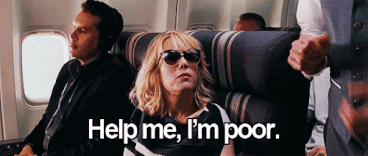|
In a few days....it's gonna be Maaayyy, and we all know what that means: Celiac Disease Awareness Month will be here! For those who do not know what Celiac Disease is, read below: What is Celiac Disease? Celiac Disease is an inherited autoimmune disease that prohibits the body from absorbing nutrients from food. Why does that happen? It happens when certain people ingest wheat, barley, rye, and some oats. When certain people eat these foods, the body sees the food as being "the enemy." During this great battle between food and body, the villi of the small intestine (this is where humans absorb nutrients) is severely damaged. Those with Celiac Disease become malnourished and at risk for serious illnesses. Some have even died from Celiac Disease (re: Joe C, Kid Rock's late friend). Is there a cure for Celiac Disease? No. Our only treatment is a life-long adherence to a gluten-free diet. How many people have Celiac Disease? It is estimated that over 3 million people have Celiac Disease. About 80% of them are undiagnosed. Who can get Celiac Disease? Since Celiac Disease is an inherited disease, you are at risk if you have a family member with it. Future generations of these families are also at risk for Celiac Disease.  So, what happens if you aren't diagnosed and you don't treat it? GF foods are expensive, you know! I get it. Times are tough, and the pandemic has made everyone's pockets emptier, even with the stimmy checks. Untreated Celiac Disease opens the door for osteoporosis, anemia, infertility, thyroid disease, other autoimmune diseases, various cancers, and even death. With that in mind, it's more than worth it to spend the extra couple of bucks on food that won't kill you. It is important to note that naturally GF foods, such as meats, veggies, fruits, some rice and potatoes, and dairy products aren't that expensive. Shop the outer perimeter of your local supermarket, and I promise you, you won't have to sell a kidney in the back alley in order to pay for said food. How long does it take to be diagnosed? Typically, it's 6 to 10 years. It's only been in the last decade or so that we've learned a lot more about Celiac Disease. Back in the 1980s and earlier, nothing was known. It was a rare illness. If you knew someone with Celiac Sprue back then, it was like finding a needle in a haystack.  My story: I've known about Celiac Disease for most of my life. My paternal grandmother was diagnosed with it in the 1980s. She was horribly sick with it, but started to improve when she started eating GF. My grandfather spent his early retirement years traveling 4 hours to a specialty store in Massachusetts for special grains to make her baked goods. He would drive home and spend his time breaking down the grains and baking muffins. I lived with my grandparents from ages 8 to 18, so I experienced everything. I even helped. I remember trying her GF food and spitting it out (it was fucking terrible. It was tasteless cardboard). Even with jam or butter on the muffins, it was repulsive. My grandmother seemed to like it, and it was helping her feel better. Sadly, the specialty store closed in 1992 (later bought out by Whole Foods), and my Celiac grandmother had to go back to regular food. She became very very sick. She lost weight, lost height, developed severe osteoporosis, and was bed bound. Again, not much was known about Celiac Disease back then, so she didn't know about shopping the outer parameter of the supermarket. Our family was flying blindly with the disease. She struggled in the years prior to her death. In 2007, she passed away from dementia. A few years after her death, I became very sick. I couldn't keep anything down, I was in the bathroom most of the day, every day, for a period of several months. I was dehydrated, weak, and scared. I went in for a blood test, and then I received a call from my doctor's office. She said that I tested "very positive" for Celiac Disease. Even when I was diagnosed, not much was known about Celiac Disease, so I was given a website to research. I was told to go gluten free immediately. I was terrified because of what my grandmother went through, but I was also relieved because I had a diagnosis. That first shopping trip at the grocery store was painful. I spent 3 hours in there reading labels (there weren't any special GF stores back then, and there weren't GF sections. I literally had to go through each aisle and read every item). It was an emotional trip because I walked by food items that I would never be able to eat again. A year after my blood test results, I had a biopsy of my small intestine. This confirmed the diagnosis. During this time, I was also diagnosed with both Ulcerative Colitis and Crohn's Disease. In 2013, I suffered a spinal injury due to Celiac's impact on my spine. I am still dealing with the injury to this day.  The Gluten Free craze, and how it affected Celiacs. Around 2013/2014, the big gluten free craze was born. While this would appear to be great for those of us with Celiac Disease, it proved to be a pain in the ass. We weren't taken seriously in restaurants, and we were scoffed at in the grocery store. To add insult to injury, we had celebrities pervert the GF diet, and TV shows depicting us as Karens. It was a welcome relief when Hollywood's "GF fad diet" went away several years later. We still have to deal with the usual suspects, however: accidental glutenings, mental health effects, being a burden on others, and doing damage control at restaurants. We know a lot more about Celiac Disease now than ever before. However, we still have a lot more to learn. While experts continue to study Celiac Disease and the effects, they are also working on a cure. Experts are hoping that there will be a cure by 2030. Are there celebs who have Celiac Disease? Yes. Joe C., Meg Cabot, Adrianne Palicki, Emmy Rossum, and Deborah Ann Woll, to name a few. What are the symptoms of Celiac Disease? There are over 300 symptoms of Celiac Disease (really). The classic symptoms include massive amounts of diarrhea, weight loss, extreme fatigue, bloating, stomach pain, anemia, headaches, serious joint pain, and more. Contrary to what you may have heard on South Park, gluten does NOT make your dick fly off...or explode.  If I suspect that I might have Celiac Disease, should I go GF before seeing a doctor? NOOOOO!! If you go GF before you see a doctor, any testing that is done will be inaccurate. It's best to talk to your doctor first, get tested, and then wait for further instruction. In the meantime, treat your symptoms as if you have the flu: rest, drink plenty of fluids (drink twice as much fluids if you have diarrhea), and keep your diet bland.  What can I do to raise awareness? Educate yourself on Celiac Disease. Beyond Celiac has A TON of information, as well as Celiac Disease Foundation. #CDAM #CeliacDiseaseAwarenessMonth #CeliacDisease #Coeliac #CeliacSprue #GlutenFree #GF #RaiseYourVoice
0 Comments
Leave a Reply. |
©2017-2024




 RSS Feed
RSS Feed